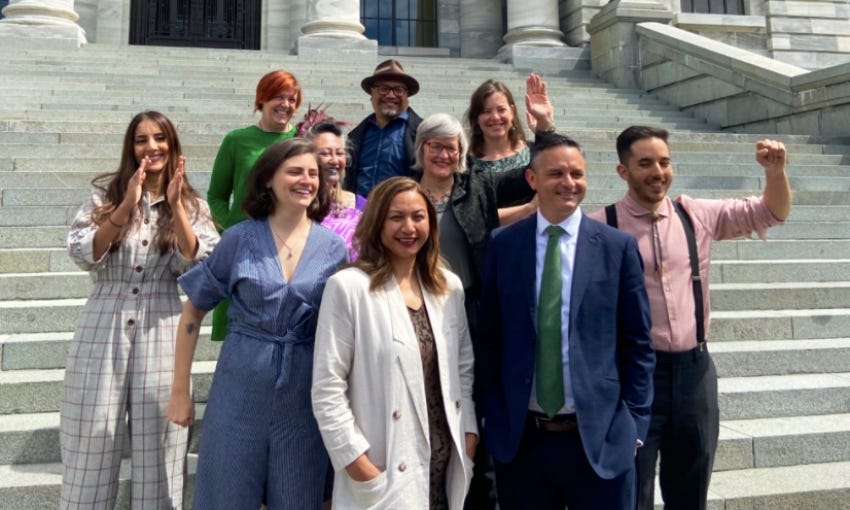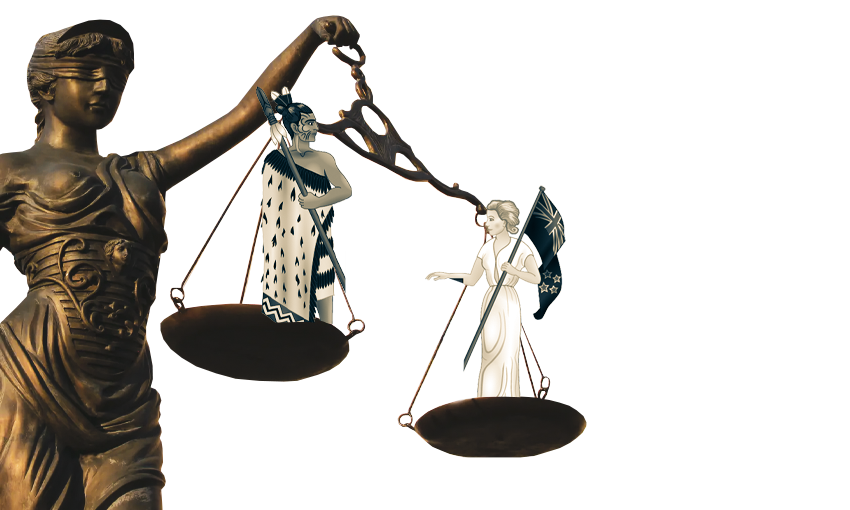
Good morning and welcome to The Bulletin for Thursday 22 October, by Alex Braae for The Spinoff. Presented in partnership with Z Energy.
In today’s edition: Questions over how Greens should approach Labour relationship, Auckland pub patrons told to self-isolate, and highly leveraged investors send house prices higher.

Image: The new Green Party caucus on the steps of parliament (Justin Giovannetti)
How lucky is the Green party, to have so many people giving advice and suggestions right now? As talks continue around the formation of the government, there's no shortage of people weighing in. That's fair enough of course, everyone has the right to an opinion. But the interesting point is of it all is that the party now finds itself in the position of considering what it should be going forward, and that has implications for what the government as a whole will be.
We'll start with two former MPs. Catherine Delahunty told Radio NZ the party would be better off sitting in opposition, and pushing on the government from that direction, particularly given the Labour majority. "I think we're going to need them to push this large monolith further to the left because the messages we're hearing from Jacinda Ardern indicate a very centrist government." Kevin Hague, by contrast, tweeted that much more could be accomplished from a place of government. "I believe the Greens should definitely seek to join government. I’m acutely aware of the urgency of the climate and biodiversity collapse crises. Action is needed now, not in 3 years." If you'll forgive the slightly sarcastic tone at the top of the piece, it's fair to assume both of these points are made in good faith.
Not everyone is quite so keen on the idea of Labour bringing the Greens in. The Employers and Manufacturers Association spokesperson Alan McDonald said that "businesses" won't want to see the Greens in government, reports Radio NZ, because in his view they would push too hard and fast on employment law changes. In a twist, co-leader Marama Davidson is sort of in agreement with the EMA, reports the NZ Herald, saying that a Labour government wouldn't go as far as the Greens would want them to. From the right, commentator Matthew Hooton wrote in the NZ Herald that either choice will contain difficulties in holding the party's internal coalition together. This one may not be written in quite such good faith, but it is a fair point.
One question for both Labour and the Greens will be figuring out what exactly the voters wanted, when delivering the shape of parliament. Some speculation has taken place that soft National voters went to Labour in order to keep the Greens out, but as Stuff's Henry Cooke fairly points out, there's not a lot of actual evidence to back that up beyond anecdote. Equally anecdotal is the suggestion from Labour activist and blogger at The Standard Greg Presland, who said he was "pretty sure there were more than a few Labour voters thinking they needed to make sure the Government was as progressive as possible and made sure that the Green Party can have a significant effect on party policy."
And what of the actual negotiations? They're ongoing, reports Stuff, and according to party leaders the current topic is what the nature of an agreement might end up being. There hasn't been any more clarity on whether a formal coalition has been ruled out, even if various reports suggest Labour is pretty cold on the idea. We should know by the end of next week at the latest what the situation is, and which of the advice-givers ends up getting what they want.
Finally, there was some genuinely generous advice given from one former MP to a new electorate MP on the Gone By Lunchtime podcast. In 1993 Sandra Lee won an upset victory in Auckland Central for the Alliance, the same seat Chlöe Swarbrick just claimed for the Greens. Lee offered the following wisdom: “Be fearless,” she said.
An update on the situation at the Sudima Hotel in Christchurch, currently hosting people in managed isolation: Checkpoint reports that 21 people have now tested positive, with 18 of those cases confirmed and three more under investigation. 235 people in fishing crews are currently staying at the hotel, and the clock may be reset on them given the spread of cases. Meanwhile in Auckland, people who attended The Malt pub in Greenhithe last Friday night are being asked to self-isolate. Our live updates has the details – the venue was visited by someone who has since tested positive. All in all, the incident gives a very good reason for why we should all keep scanning regularly on the Covid app, or more generally keeping track of movements.
House prices are set to spiral even higher, with highly leveraged investors rushing out to buy even more, reports Tamsyn Parker for the (paywalled) NZ Herald. There's also an increase in the market share being seen for first home buyers, with both categories benefitting from Reserve Bank moves to drop loan to value ratio restrictions, meaning people with smaller deposits could more easily get a mortgage. Governor Adrian Orr suggested that the RBNZ is currently looking at whether that needs to change again, and said that if prices are being driven by the very highly leveraged, that could become a real worry.
Further to yesterday's discussion about adapting to climate change, this is a piece about an incredibly important and under-discussed piece of legislation. Stuff's Thomas Coughlan has written about the Managed Retreat and Climate Change Adaptation Bill, which is basically a proposed law to move people and property away from places that will become unlivable – very low lying coastal areas being one example. The details of all of this are yet to be thrashed out, and it will be highly contentious. Expect to hear a bit more about it over the coming three years.
The red meat sector is bracing for a big hit from Covid-19 in the next year, reports the NZ Herald's (paywalled) Jamie Grey. That's because the potential export markets are being hit hard by economic slumps, which reduces purchasing power. The effects are likely to flow through to farmgate prices and profits.
I'm personally very interested in seeing what happens to MPs who lost their seats last weekend, and the future for this one in particular could be fascinating. The NZ Herald reports outgoing National MP Alfred Ngaro held a prayer on the steps of parliament yesterday. He was of course exploring the formation of a Christian values political party last year, but declined approaches from a group who went on to form the ONE Party. In fact, as the video in the article shows, ONE Party co-leader Stephanie Harawira was there on the steps with him.
A fascinating piece about the lines of defence the country has against Covid, and how they can be likened to layers of Swiss cheese. As Siouxsie Wiles and Toby Morris explain, that's not a knock on them – rather it's about the inevitability of holes in systems, and that's why we need to keep on top of other mechanisms to keep the virus out, and keep it from spreading if it does get out.
Got some feedback about The Bulletin, or anything in the news?
Drop us a line at thebulletin@thespinoff.co.nz

Right now on The Spinoff: Shabnam Dastgheib writes about an online support group aimed at getting those made unemployed recently back on their feet. Don Rowe meets the post-graduate students putting tikanga and kaupapa Māori at the centre of learning how to lead. Stewart Sowman-Lund reviews Taskmaster, which he says proves New Zealand TV can do panel comedy shows. Jean Sergent reviews The Vow, a docuseries that takes a deep dive into the cesspit of the NXIVM cult. Jack Vowles writes about vote volatility, and the challenge ahead for Labour to maintain their newfound dominance. Professor Jacinta Ruru writes about the need to integrate tikanga into legal education. Alice Webb-Liddall has a great feature on Sports Team, a duo behind some of the coolest music videos being made right now. And Michael Andrew has taken it upon himself to review every slice of gluten free bread available in New Zealand.
For a feature today, a stark warning about the dangers of the public service falling to political interference. The US once had the sorts of institutions that would make fighting Covid-19 possible, including the highly vaunted Centre for Disease Control. But as this ProPublica investigative feature reveals, the capabilities and reputation of the CDC have crashed throughout Covid, and it may struggle to ever recover. Here's an excerpt:
The next day, Trump put Vice President Mike Pence in charge of his coronavirus task force and assumed the role of communicator-in-chief. The CDC, which had been the public face of the government during every health crisis in memory, soon became nearly invisible. After a few more briefings, a Pence aide told the agency’s media staff that this was the president’s stage, not theirs.
Even when Redfield was allowed to speak publicly, his sleepy eyes and soft, droning tone anesthetized listeners. The agency had been effectively muzzled.
“When it mattered the most, they shut us up,” a senior CDC official said. “The threat is clear. If we want to ever be able to talk tomorrow or next week or next month — or whatever is being dangled in front of us, you stay inside the lines.”
Champion rower Robbie Manson won't be going to the Tokyo Olympics next year, after announcing his retirement from the sport. Stuff reports he goes out with the fastest ever time in the single sculls, set at the 2017 World Rowing Cup. It probably wasn't going to be the boat he competed in at the next Olympics, having shifted to double sculling. What will Manson do next? He may get into equestrian, if some hints at the end of the story are anything to go by.
That's it for The Bulletin. If you want to support the work we do at The Spinoff, please check out our membership programme




